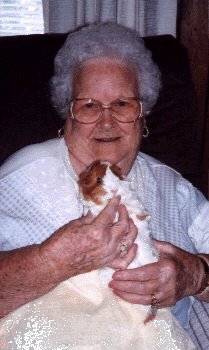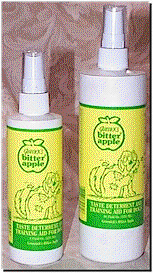
Some cavies do nip, chew or bite. A little
chewing is natural for cavies, it is how they investigate things
and how they socially interact with each other. Chewing on an
owner's hands, arms, clothing or hair is natural for the curious
or sociable cavy. It is not unusual for baby cavies to bite.
Like puppies and kittens, cavy pups may be rambunctious and nippy.
With time, maturity and lots of secure gentle handling the biting
almost always gets better. I've never had a cavy with an attitude
or handling problem that didn't improve with time and tender
loving care. Whether they improve enough to be a trustworthy
children's pet or a couch potato pig is another matter.
Older cavies may bite out of fear, traumatic
handling, lack of socializing, playfulness, curiosity or just
plain brattiness. Some cavies may have a genetic tendency towards
shyness and biting. Often the worst biters I get have been either
seldom handled or roughly handled - held too tightly or left
to dangle loosely in the air, mostly by children too young to
be holding any animal unsupervised. Isolating cavies can also
make them skittish. One reason I discourage the use of aquariums
and deep plastic tubs as cavy housing is because they severely
limit a cavy's exposure to surrounding sights, sounds and smells.
All he can really experience is what's immediately around him
or straight up (if there is no lid). This isolation can cause
a cavy to react wildly to sudden sounds and movement. Keeping
the cage in an isolated room seldom visited by family members
can also make a cavy unsociable, bored and lonely.
It's important to note that cavies may
also nip or bite out of pain or discomfort. It is not unusual
for a cavy with mite infestation to react to handling by biting.
Sarcoptic mites burrow down into the cavy's skin, causing intense
itching, which can be further irritated by handling. It is a
good idea to have a nippy cavy examined by a veterinarian to
make sure there isn't a physical reason for the behaviour.
Picking up a cavy needs to be done calmly
and smoothly, with both hands - no chasing, no grabbing. I like
to "herd" the cavy to a corner of the cage then scoop
it up with both hands securely supporting it's entire body. The
cavy should be held often, on a towel if necessary to protect
yourself from being bitten. Slow circular rubs with your fingertips
tend to calm and comfort most animals. Feel free to bribe the
cavy with hand fed special treats while holding it. I also like
to give "body scrunches" -- which means I give firm
but gentle squeezes and rubs with one or both hands all over
the cavy's body. I have them sitting in a natural position on
my lap or chest when I do this. Most cavies learn to enjoy body
scrunches. It feels good and they get used to my touch. This
also shows them a few nips will not intimidate me or keep me
from handling them.
|
 |
I have a darling little Teddy named Theadora
who was a holy terror as a youngster. Nippy, speedy, didn't want
to be held or cuddled. She put up the biggest fuss during body
scrunches - kicking, squealing and thrashing about. But when
I stopped, she'd get quiet, look around, nibble my hand a little
bit - and wait patiently for more. She grew to love body scrunches,
still does. Theadora will always be an independent little pig,
but she is much much easier to handle now and appreciative of
cuddling. She still bites, but just little unpainful love bites.
It's part of her charm.
When I think about it, a couple of my
most favorite cavies have been nippers. Both sows coincidentally.
Jetta was a breathtaking red satin Abyssinian. She'd often give
a good sharp nip just to let me know she couldn't be taken for
granted. Then she'd stretch and yawn and snuggle down comfortably
in my arms. I loved that pig. Little Zippity, a chocolate/cream/white
American, came to me when she was 4 years old. She was in awful
condition, suffering bumblefoot, malnutrition and a mammary tumor.
Eventually we got Zippity fixed up and in good shape. The little
darling showed her undying gratitude by biting me everytime I
picked her up. I don't know if it was a habit from past traumatic
handling or if she was just a snot. Zippity enjoyed the attention
once I was holding her and absolutely loved gentle tickles and
chin rubs. She was so naughty, but very adorable. Headstrong
Jetta and Zippity have since passed on, I miss them very much.
Sometimes it helps tone down a bad or
wild attitude if you can room a problem cavy with a mellow easily
handled one. Cavies often copy and learn from each other and
the youngsters especially watch what the older cavies are doing.
Even a juvenile delinquent that is exhibiting bad behavior might
calm down if he is one-on-one with a well-mannered adult cavy.
 |
Cavies do not seem to learn from punishment
or discipline. Squirting them with water or tapping their nose
may make them fearful of you, but I doubt they'll get the connection
and stop biting. Bitter Apple, an anti-chewing spray available
at most pet stores, can be rubbed on whatever body part the cavy
usually bites. The unpleasant taste and smell might possibly
discourage the cavy from biting, or he is likely to avoid that
area.
|
Unfortunately, some cavies will continue
to nip. With effort and attention this problem will improve but
maybe not to a point where the cavy would make a good pet for
families with children or people inexperienced with cavies. These
"Attitude Pigs" will need patient, understanding adult
owners that can take an occasional nip without losing their temper
or their love for the animal. If he is more sociable with his
own kind, such a cavy might do better as a cavy's companion rather
than a human's companion. His role can be kind of like a pet
for a more sociable easily handled cavy.
When I get cavies that bite or are difficult
to handle I plan on keeping them here indefinitely. Hopefully
they will learn to trust and relax, gradually mellowing out to
become cuddly affectionate pets. If not, they stay here - I never
euthanize because of an attitude problem. When possible I will
pair a nippy stinker up with a friendly easy-going cavy. That
way both animals have companionship even if one prefers not to
be greatly smooched and cuddled by humans. Often even these really
tough cases will eventually calm down enough to become adoptable
- if I'm lucky enough to find somebody willing to adopt an older
cavy.
One of the fun things about cavies is
that they all have their very own unique individual personalities,
quirks, likes and dislikes. Some cavies thrive on having a big
fuss made over them. Some prefer a slow dignified scratch between
the ears to being held. Others will take all the treats and perks
you have to offer - just don't expect any mushy stuff in return.
Like people, each cavy needs to be enjoyed and appreciated for
what he is.
This article and the JPGPR.com
logo are © 1993-2003 Vicki Palmer Nielsen - Jack Pine Guinea
Pig Rescue. No copyright is asserted herein regarding the illustrations
accompanying the article; copyrights, if any, of the illustrations
are retained by the original holders. If you would like to reproduce
anything from the website, please first e-mail Vicki for permission at
:

|




